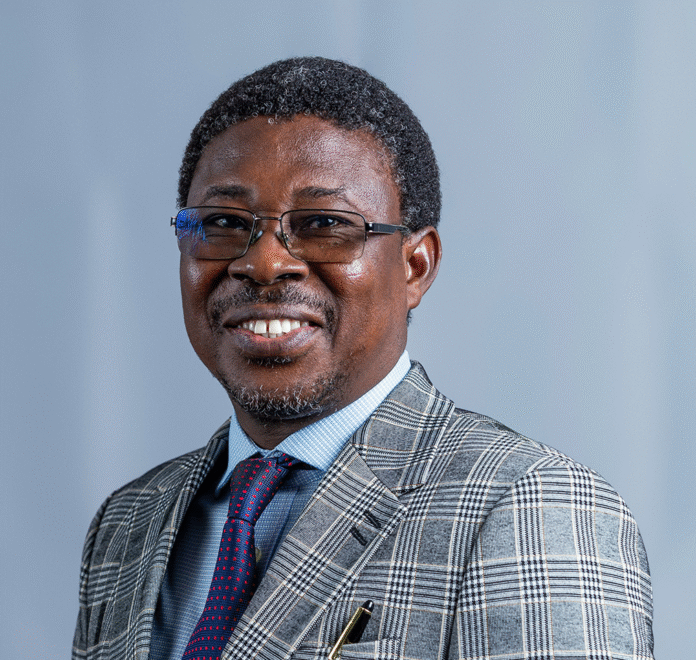In a thought-provoking edition of the Research and Innovation Agenda on Radio Univers, host Dr (Alhaji) Abubakar Siddique Ahmed engaged Professor Justice Nyigmah Bawole, Dean of the University of Ghana Business School, in an intellectual discussion surrounding his recent inaugural lecture titled “Our corruption, our ethics, our public administration: wicked citizens, wicked problems and stagnating development.” The interview served as a platform to critically examine the ethical dilemmas and corruption challenges faced by Ghanaian society today.

Throughout the interview, Professor Bawole stressed the necessity of revisiting indigenous ethics and confronting societal disconnections. He called for collective introspection, stating that the challenges faced today require courageous leadership and a reimagining of institutional integrity.
The Concept of Collectivism and the Theory of Two Publics
A significant aspect of Professor Bawole’s lecture was his exploration of collectivism, a cultural framework that defines many African societies, including Ghana. He explained that collectivism fosters a sense of community in which individual actions are often intertwined with the group’s identity.
He also discussed the theory of two publics, articulated by Nigerian scholar Professor Peter Ekeh. This theory posits that individuals behave differently in their local, primordial public—where cultural accountability is strong—compared to the civic public, where rules appear less binding. He argued that this duality allows individuals to justify unethical actions in public spaces, as they feel detached from the broader societal implications. This disconnect, he warned, perpetuates a cycle of corruption that undermines national development.
Unveiling the Ethical Crisis
Professor Bawole began the conversation by delving into the roots of Ghana’s development stagnation, attributing it not merely to ineffective policies but to a profound ethical crisis within society. He emphasised that corruption in Ghana is not an anomaly but a systemic issue co-authored by both the state and its citizens.
“We are not victims; we are perpetrators,” he asserted, urging listeners to reflect on their roles in perpetuating corruption. He explained that he has long observed society with unease, recognising the country’s rapid descent down a slippery slope that appears to have no end in sight.
Professor Bawole’s framing of the topic sought to ignite a national conversation. He said he crafted the lecture’s title to encourage people to pause and explore its contents. By using the phrase “our corruption, our ethics, our public administration,” he aimed to prompt reflection on personal contributions to corruption and urged all Ghanaians to assess their impact on the nation’s ethical landscape.
The Concept of Wicked Problems
A cornerstone of the discussion was the concept of “wicked problems,” which Professor Bawole described as complex issues that lack simple solutions. He argued that corruption is a prime example, deeply embedded within the fabric of Ghanaian society. He explained that many citizens engage in corrupt practices, believing they are merely following the example set by their leaders.
Dr Ahmed and Professor Bawole further explored the implications of ethical collapse across various sectors, including public administration, education, and healthcare. Professor Bawole shared poignant anecdotes, including the tragic consequences of inadequate healthcare infrastructure, to underscore the urgent need for ethical governance. He recounted instances in which corruption led to the neglect of essential services, resulting in preventable deaths due to a lack of ambulances and medical supplies.
A Tripartite Agenda for Moral Renewal
To address the overwhelming consequences of these “wicked problems”, Professor Bawole proposed a tripartite agenda for moral renewal:
- Civic Re-education: Reinforcing the importance of moral values in society. He emphasised that civic education should begin at an early age to help children develop a strong ethical foundation.
- Celebration of Good Leadership: Highlighting positive role models within the community to inspire ethical behaviour and discourage corruption.
- Implementation of Ethics Training: Making ethics education mandatory within academic curricula to better prepare future leaders and professionals.
A Personal Commitment to Ethical Leadership
In a compelling personal commitment to integrity, Professor Bawole stated that since becoming Dean, he has refused to accept gifts in his official capacity. “I want to set a precedent for ethical leadership,” he explained, stressing the importance of leading by example in a system fraught with corruption.
To contribute to the change he wishes to see across the country, Professor Bawole expressed his intention to engage in personal advocacy by actively promoting moral renewal in Ghana. He plans to establish ethics clubs in schools, collaborate with media outlets to highlight positive role models, and mobilise resources to support educational initiatives aimed at instilling strong ethical values in young people.
A Call to Action
The discussion highlighted the societal impact of corruption, as Professor Bawole delved into the normalisation of unethical behaviours in everyday life. He lamented the fact that young people—who are supposed to be the future of the nation—are often exposed to a culture of corruption that undermines their moral compass.
In his closing remarks, he reiterated the importance of collective action in combating corruption, stating, “No one will solve this problem for us but us.” He called upon all stakeholders—government, academia, and civil society—to engage in advocacy and collaboration, particularly in support of the ethical education of young people. He also urged the media, including the Research and Innovation Agenda, to play a vital role in promoting ethical discourse and amplifying success stories of integrity within the community.
Conclusion
As listeners were left to ponder the profound views shared, it became clear that the conversation was not merely academic, but a rallying cry for a transformative shift in Ghana’s ethical landscape. Professor Bawole’s perspectives serve as a reminder that the path to progress in Ghana lies not only in policy reforms but also in a collective commitment to nurturing ethical citizens.
The Research and Innovation Agenda continues to be a vital platform for such crucial discussions, fostering thought leadership rooted in African wisdom and global insight. With the urgency of ethical renewal underscored by Professor Bawole, Ghanaians must engage in self-reflection and take proactive steps to restore integrity within the nation.
DISCLAIMER: The Views, Comments, Opinions, Contributions and Statements made by Readers and Contributors on this platform do not necessarily represent the views or policy of Multimedia Group Limited.
DISCLAIMER: The Views, Comments, Opinions, Contributions and Statements made by Readers and Contributors on this platform do not necessarily represent the views or policy of Multimedia Group Limited.


